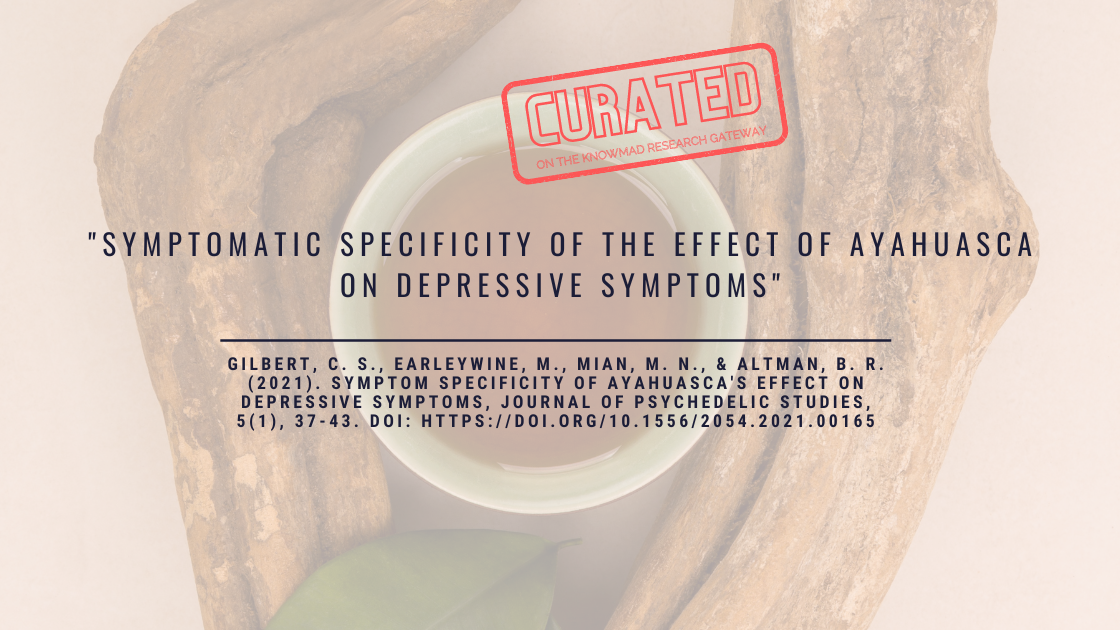Knowmad Review: Cannabis and 3D Data

The Knowmad Institut has selected three multidisciplinary studies for curation from the Knowmad Research Gateway that address topics of interest and relevance in the field of science and human rights. The first study explores the factors influencing consumers’ choice of cannabis products, highlighting the role of price and product quality. The second study focuses on the need for more scientific evidence on using cannabis for medicinal purposes and the genetic factors associated with treatment. The third study examines how incorporating 3D data from urban settlements can improve Europe’s population data quality and accuracy.
Ayahuasca, a new hope for treating symptoms of depression?

Ayahuasca, a psychedelic beverage, has generated great optimism about its ability to treat depression. A new study, “Symptomatic specificity of the effect of ayahuasca on depressive symptoms,” conducted by authors Cody Sykes Gilbert, Mitch Earleywine, Maha N. Mian, and Brianna R. Altman, examines the specific effects of ayahuasca consumption on depressive symptoms. The study found that ayahuasca had a more significant impact on affective symptoms, such as hope, depressed mood, and happiness, compared to cognitive, interpersonal, and somatic symptoms. The study suggests that ayahuasca may be most helpful in treating affective symptoms of depression and has great potential for those who seek relief similar to that obtained with serotonergic medications.
Study Reveals Surprising Link Between Cannabis Use and Lower Body Weight in Hepatitis C Patients

A study has found that patients with chronic hepatitis C virus (HCV) who use cannabis have a lower risk of obesity and central obesity. The study, which analyzed data from the French ANRS CO22 Hepather cohort, used logistic regression models to examine the inverse relationship between cannabis use and body weight in HCV patients. The results showed that current cannabis use was associated with a lower risk of central obesity, BMI-based obesity, and overweight. This relationship was also observed in former cannabis use but to a lesser extent. The study suggests that cannabis use may be a factor in reducing obesity in HCV patients, but further research is needed to confirm these findings.
MDMA, Automation and Rights to Preserve Biological Diversity | Knowmad Alert N°17

This Week:
Use of MDMA in the treatment of eating disorders. The uneven effects of trade and automation on local labor markets. And rights-based conservation to preserve biological diversity.
Agroecology as a response to COVID-19, LSD and Blockchain for IoT | Knowmad Alert N°16

This Week:
We explore the response from family farming and the agroecology movement to the COVID-19 crisis. A study on how lysergic acid (LSD) promotes social behavior and how the Blockchain can ensure the security of the Internet of Things.
Cannabis, Surveillance, and Security in Bitcoin Hot Wallets | Knowmad Alert N°15 |

This Week:
A study on the effects of cannabis on visual function, an article on control technologies as a response to the health crisis, and an investigation into security threats in Bitcoin hot wallets.
Autonomous Weapons Systems, Labor Exploitation and Harmful Use of the Blockchain | Knowmad Alert N°14 |

This Week:
We explore the debate on banning Autonomous Weapons Systems, learn about the situation of human trafficking and labor exploitation in Germany, and learn how Blockchain is being Instrumentalized in Pacific countries.
Artificial Intelligence, Cannabis and Biomedical Waste | Knowmad Alert N°13 |

This Week:
“Does technology care?” this is the question at the intersection of medical education and artificial intelligence. Deep Learning to detect and classify diseases from the Cannabis plant. And the effect of biomedical waste incineration, a worrying situation in India.







